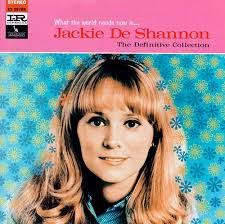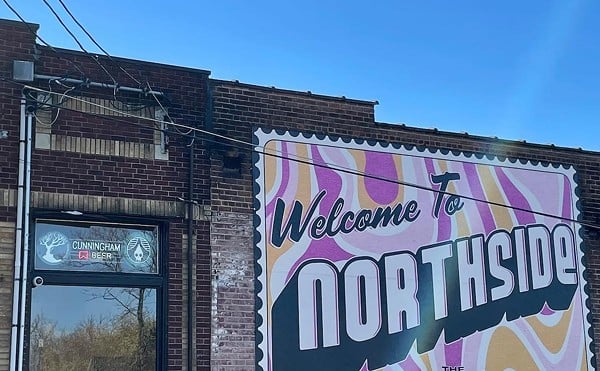Sometimes musicians have to leave the Midwest to get better — they need more ideas than any one region can provide.
That was the case with Jackie DeShannon, whose long career has included such hit recordings as the Bacharach/David composition “What the World Needs Now” and her own “Put a Little Love in Your Heart,” the first versions of the early Folk Rock/British Invasion classics “Needles and Pins” and “When You Walk in the Room” and co-writing the song “Bette Davis Eyes.”
Now in her mid-sixties, DeShannon is enjoying the reissue of four of her original albums — 1963’s Jackie DeShannon, 1967’s Me About You, 1970’s To Be Free and 1975’s New Arrangement — on the Collectors’ Choice Music label (www.ccmusic.com). The middle two releases are combined on one disc; the other two are available as separate discs.
Long associated with the Southern California sound — her 1969 album Laurel Canyon was one of the first to romanticize that part of L.A. as the home of hip culture — she’s actually a product of rural Kentucky and the Midwest. She was born in either 1942 or 1944 (she won’t say which; both dates have been reported) as Sharon Lee Myers in Hazel, Ky., and started singing Gospel very early on the radio. She continued singing and broadening her range when her family moved to Batavia, Ill., near Chicago.
As a teenager, she had a throaty, powerful voice capable of Brenda Lee-like power and a love for Buddy Holly — one early song was “Buddy,” a self-penned tribute to him recorded before his Feb. 3, 1959, plane crash death. And among her earliest bluesy, Rockabilly-styled recordings were several cut at Cincinnati’s King Records studio.
She recorded “Just Another Lie” with local musician Rusty York’s band supporting her in 1958 and released it on Cincinnati’s Fraternity label, according to music researcher Peter Lerner for the site Spectropop.com.
She was using the name Jackie Shannon at the time. Then, in 1959, she went back into the King studios with York’s band, The Cajuns, and covered the Elvis tune “Trouble” along with a soulful rocker called “Lies.” During the same session York recorded his national hit, the rockabilly-flavored “Sugaree.”
DeShannon’s cuts were released on a label called P.J., controlled by Pat Nelson, manager for York and DeShannon at the time. In Randy McNutt’s book We Wanna Boogie, York recalled: “Man, that girl could sing. We’d travel around to these little record hops and television dance programs, and she would say that she wanted to be a big-name singer. All I can remember is that she wore these bright gold pants.”
DeShannon today remembers little of those early sessions, although she says she didn't live in Cincinnati at the time. She was still based in Illinois but traveling and recording quite a bit in the region and even New York.
She was trying to break through in an environment unfriendly to strong-willed female artists. She didn’t have a touring band but rather promoted her singles by appearing at local radio station-sponsored events. At one in Chicago, after her Cincinnati recordings, she met another Rockabilly-influenced singer who'd had considerably more luck: Eddie Cochran of “Summertime Blues” fame.
“He said, ‘If you want to get serious, you have to go to California — you’re a California girl,’ ” she says during a recent telephone interview from her California home. “I think he saw the opportunity there for me, as opposed to being stuck in one part of the country. California was much more aware of what was coming — it was hipper, and it was far more advanced as far as recording. It was just beginning to bubble.”
Partly, she says, that was due to musicians from all over the country bringing their regional influences to Los Angeles studios. The result was a musical melting pot.
“All these people were coming from all over the U.S. and all were pretty darn good,” she says. "They sang, they wrote songs, played instruments, they were well-educated musically in the sense they knew its history And they spurred each other."
In California, DeShannon was signed by Liberty/Imperial Records, primarily to be part of a Los Angeles-based group of youthful songwriters. But she still tried to be a recording star, a striking presence with her long blonde hair.
But the record company didn’t understand her restlessly shifting, eclectic tastes. There was the tussle over her two prescient 1963 singles with their chiming guitars and organic Rock-band sound: “Needles and Pins” and “When You Walk in the Room.”
They didn’t get much of a label push, DeShannon says, and it was left to The Searchers, a British Invasion band, to have subsequent hits with them.
“If only I had been with a John Hammond at Columbia, who was instrumental in keeping Dylan at the label,” she says. “I did not have that kind of mentor with leverage at the record company. So I just fought as hard as I could to do the kind of music I wanted to do. I was just trying to move forward with my music.”
And over time she did, her first hit coming with 1965’s “What the World Needs Now.”
Incidentally, DeShannon’s husband, film and TV-score composer Randy Edelman, graduated from the University of Cincinnati’s College-Conservatory of Music in 1969 and also worked as a King Records arranger. In 2004, he received an honorary doctorate from UC with DeShannon present.
“It was very, very exciting,” she says.






